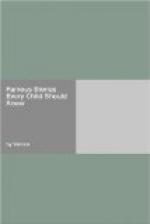When they were gone, Gluck took a farewell look at his old friend in the melting-pot. The flowing hair was all gone; nothing remained but the red nose, and the sparkling eyes, which looked more malicious than ever. “And no wonder,” thought Gluck, “after being treated in that way.” He sauntered disconsolately to the window, and sat himself down to catch the fresh evening air, and escape the hot breath of the furnace. Now this window commanded a direct view of the range of mountains, which, as I told before, overhung the Treasure Valley, and more especially of the peak from which fell the Golden River. It was just at the close of the day, and when Gluck sat down at the window he saw the rocks of the mountain tops, all crimson and purple with the sunset; and there were bright tongues of fiery cloud burning and quivering about them; and the river, brighter than all, fell, in a waving column of pure gold, from precipice to precipice, with the double arch of a broad purple rainbow stretched across it, flushing and fading alternately in the wreaths of spray.
“Ah!” said Gluck aloud, after he had looked at it for a while, “if that river were really all gold, what a nice thing it would be.”
“No it wouldn’t, Gluck,” said a clear, metallic voice close at his ear.
“Bless me! what’s that?” exclaimed Gluck, jumping up. There was nobody there. He looked round the room, and under the table, and a great many times behind him, but there was certainly nobody there, and he sat down again at the window. This time he didn’t speak, but he couldn’t help thinking again that it would be very convenient if the river were really all gold.
“Not at all, my boy,” said the same voice, louder than before.




